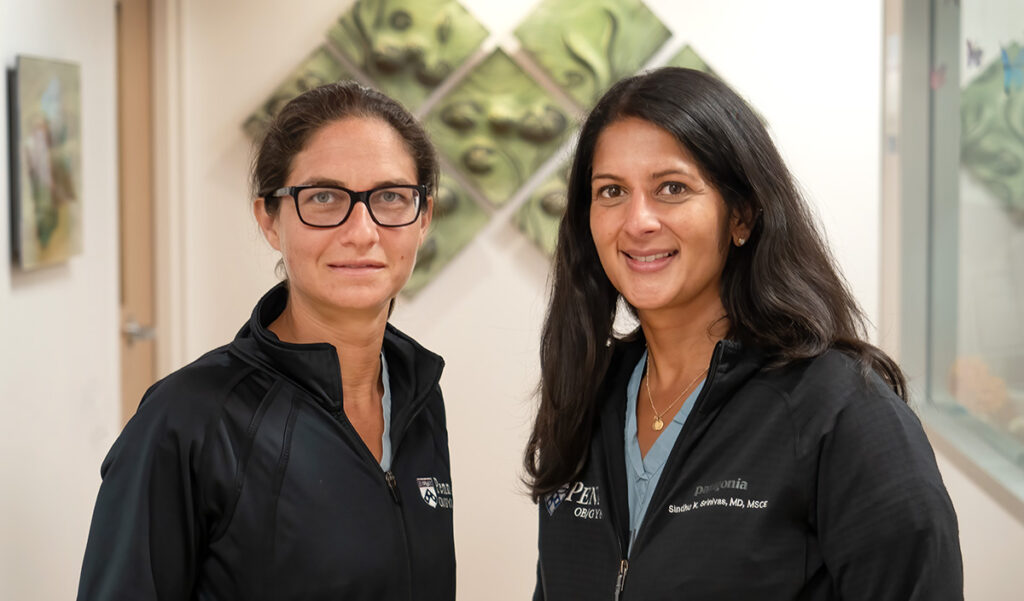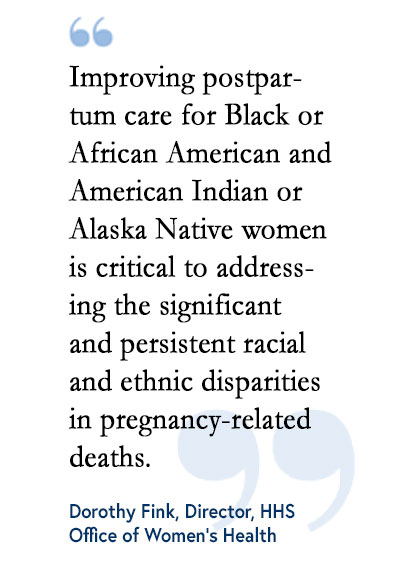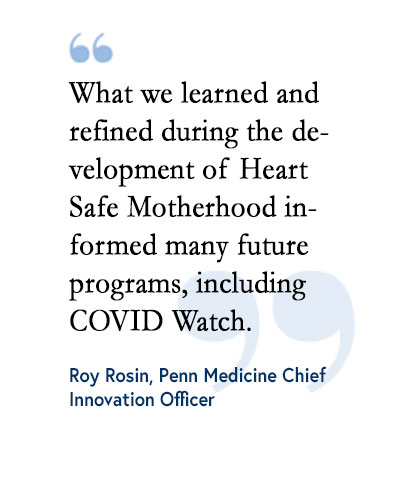
New National Study Finds Doctors Paid Less for Treating Black and Hispanic Patients
Physicians Were Paid About 10% Less for Visits Involving Black and Hispanic Patients, With Pediatric Gaps Reaching 15%, According to a First-of-Its-Kind LDI Analysis
News

It’s rare for any innovation in health care delivery to achieve an overnight 80% improvement. Yet, eight years ago, that’s what happened with Penn Medicine physicians Sindhu Srinivas, MD, MSCE, and Adi Hirshberg, MD, when they applied then-novel digital technologies to the control of postpartum preeclampsia complications among their OB/GYN patients at the Hospital of the University of Pennsylvania (HUP).
The program that evolved—Heart Safe Motherhood—is an algorithmically-driven system that maintains twice daily two-way text-message communications with post-delivery patients after they’ve gone home. The new mothers are supplied with a blood pressure cuff and prompted by the messaging system to report their readings twice daily for 10 days. Incoming readings are automatically analyzed based on a pre-programmed algorithm, and clinicians are immediately flagged when potentially dangerous increases in blood pressure are detected.
A 2019 study published in the American Journal of Obstetrics & Gynecology by Hirshberg and Srinivas found that the system eliminated the blood pressure check disparity between white women (who attended in-office pressure checks twice as often as Black women) and Black women using the text message-based monitoring system. Both groups achieved the same compliance level at over 90% with Heart Safe Motherhood.

About 10% of pregnancies are complicated by preeclampsia, which is the leading cause of seven-day obstetrical readmissions and responsible for about 20% of the maternal deaths in the United States each year.
Now used throughout the Penn Medicine system of OB/GYN departments and in a small number of other hospitals across the country, the Heart Safe Motherhood system and its two founders have just won one of the 25 grants awarded in the U.S. Department of Health and Human Services (HHS) Office on Women’s Health (OWH) Racial Equity in Postpartum Care Challenge.
The national research competition sponsored by OWH, and the Centers for Medicare & Medicaid Services (CMS) is designed to identify, develop, and disseminate innovative methods to improve postpartum care for Black or African American and American Indian/Alaska Native women enrolled in Medicaid or the Children’s Health Insurance Program (CHIP). The first round of awards went to 25 research teams working in different ways to address aspects of care related to the disproportionately high levels of maternal mortality and morbidity among women of color.
“Improving postpartum care for Black or African American and American Indian or Alaska Native women is critical to addressing the significant and persistent racial and ethnic disparities in pregnancy-related deaths,” said OWH Director Dorothy Fink, MD, as she announced the awards. She also noted the wide potential impact of the effort because Medicaid covers 42% of all U.S. births including two-thirds of all births to minority women.
Srinivas, an LDI Senior Fellow and Director of Obstetrical Services at HUP said: “This challenge award is a great step in helping to disseminate a solution to one large contributing cause of maternal mortality and morbidity. We’re very grateful for having received this award and hope programs like this will continue to stimulate the development of innovative solutions that reduce disparities in maternal morbidity and mortality.”
Hirshberg, an Assistant Professor at the Perelman School of Medicine and Associate Director of Obstetrical Services at HUP said: “Another reason it was exciting to be selected is that the other 24 winners are invested in their own processes and programs and all of us can learn from that work and potentially build on what we haven’t previously thought of. I think HHS and CMS are really going in the right direction with this challenge that brings a sharp national focus on maternal mortality overall, along with other disparities.”
The story of Heart Safe Motherhood began in 2014 when the two Penn maternal fetal medicine specialists were struggling to solve one of their obstetrical practice’s biggest problems: convincing mothers to return to the hospital to be checked for abnormal blood pressure elevations in the first two weeks after delivery.
This is the standard of care treatment required because the most likely period for preeclampsia conditions to manifest is within the first 10 days or so after delivery and it’s difficult for physicians to predict which maternal patients will be at risk during that time. The traditional rule has been to have the women return to the hospital 72 hours after delivery for blood pressure checks and then return again seven days later. But busy with erratic sleeping and feeding schedules of their new infants, and often facing transportation, childcare, and other obstacles, new mothers routinely skipped making a return trip to the hospital for those blood pressure checks.

In 2014 at the HUP OB/GYN Department, less than 50% of delivery patients were returning for the first blood pressure check and almost none returned for the second.
Frustrated, the two Penn researchers began testing other approaches, including alternative staffing models and increased availability of appointments. But those resulted in no improvement in return visits.
Then, by chance, they noticed all the women in their waiting room were on their cellphones and the lightbulb of invention flashed on: “What if we sent them home with a free blood pressure cuff and instructions for how to text-message their pressure readings to us?” they asked themselves.
Over the next three years, working in collaboration with the Innovation Accelerator Program at the Penn Center for Health Care Innovation, Srinivas and Hirshberg began scientifically testing and refining their idea. Built on the Way to Health web-based automation platform at the Penn Center for Health Incentives and Behavioral Economics (CHIBE), the emerging Heart Safe Motherhood system remotely engaged post-delivery patients on their mobile phones, reminding them to take their blood pressure and report other symptoms or condition changes as they happened.
Aside from solving their own problem, the researchers’ ideas and work advanced the pioneering efforts of the Innovation Center itself, according to Penn Medicine Chief Innovation Officer and LDI Senior Fellow Roy Rosin, MBA. “Heart Safe Motherhood was the first Innovation Center project to use algorithmic two-way texting to drive high value interventions,” Rosin said. “What we learned and refined during the development of that program informed many future programs, including one of the best-known ones, COVID Watch.”
In 2017, a randomized controlled trial rigorously compared Heart Safe Motherhood’s remote blood pressure monitoring to the previous standard of in-person-visit blood pressure monitoring. The result was an 80% improvement in ability to achieve the two blood pressure readings required in the first 10 days. A second result was that the system reduced the seven-day hospital readmission rate from 5% to 1%.
“The really large improvement didn’t actually surprise me,” remembered Srinivas. “It just made us understand how long we had been making it so hard on these women when something as simple and effective as this remote mobile phone solution was possible. It made us wonder how was it that we didn’t think of this earlier.”
In 2018, Heart Safe Motherhood rolled out as a routine service for all women delivering in HUP and soon after expanded into the OB/GYN Departments of all Penn’s hospitals. Since then, it has also expanded to a small number of hospitals beyond Penn and research pilot projects at Northwestern University, the University of North Carolina and the Washington University in St. Louis.
Its 2022 selection by the HHS/OWH Racial Equity in Postpartum Care Challenge is now likely to help it spread much farther much faster.


Physicians Were Paid About 10% Less for Visits Involving Black and Hispanic Patients, With Pediatric Gaps Reaching 15%, According to a First-of-Its-Kind LDI Analysis

New Study From LDI and MD Anderson Finds That Black and Low-Income, Dually Eligible Medicare Patients Are Among the Most Neglected in Cancer Care

Equitably Improving Care for Hospitalized Kids Who Experience Cardiac Arrest Requires Hospital-Level Changes, LDI Fellows Say

Billing Codes That Flag Food, Job, or Housing Insecurity in Medical Records are Underused for the Sickest Medicare Patients

Experts Say Nursing Ethics Can Help Researchers Confront Federal Disinvestment, Defend Science, and Advance Health Equity

Study Finds Major Gaps in Cardiac Care Behind Bars